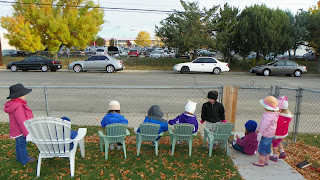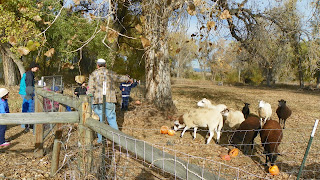On Friday, the children went to visit Ollin Farms, and their favorite farmers Mark and Kena Guttridge, on their final trip to the farm for the CSA season. While visiting the farm serves the important purpose of teaching the children about where their food comes from, how it is cultivated, teaching them valuable concepts in nutrition, botany and science, and encouraging children to develop an appreciation for a wide variety of fruits and vegetables, this trip served another very important purpose- the children were going to select their pumpkins from the Ollin Farms pumpkin patch.
The trip began in the same fashion as most of our field trips- with excited children rousing their parents at first flush of morning, sharing a hearty snack with their friends, and situating themselves in front of the fence to anxiously await the first glimpse of that icon of American public education, the big yellow school bus.
The children were entertaining themselves by singing The Wheels on the Bus, when our favorite bus driver pulled up, overheard their singing, and surprised them by tapping the horn just in time for their "horn on the bus goes beep beep beep" refrain. SVVSD bus driver, Daniel Grove, is what every bus driver should be- kind, patient, and visibly fond of children. We had been fortunate to have him as our driver on our last field trip to Fiske Planetarium, where he reminisced about his own children, who had also attended Montessori schools, and remarked upon how well mannered the children were.
The doors to the bus slid open and our merry little travelers set off on the short trip to the farm.
Our bus had arrived at the school early, and the children are so used to the routine of finding their seats, buckling up, and traveling with polite manners, that we got to the farm earlier than expected. We were in the process of considering where to wait until our host arrived, when Bruce passed by and invited the children to help him feed the sheep. The words had barely escaped his lips and the children were off and running at full speed toward the sheep.
Of all of the field trips the children go on, I must admit that the trips to the farm are my favorite. As the children are racing about these wide open spaces, experiencing nature, caring for plants and animals, hunting for highly prized rocks and sticks, rambling through marshes, delighting in fortuitous encounters with frogs, turtles, insects, or crayfish, and testing their strength and agility with a variety of impromptu physical challenges (balancing on rolling logs, hopping from stump to stump, climbing up fences, and heaving heavy vegetables), something quintessential to childhood, and maybe to humanity, is revealed.
Interestingly, despite their different modes of investigation, most disciplines recognize this phenomena and attribute importance to it. In the positive sciences, Harvard biologist E. O. Wilson calls this biophilia, the tendency of humans to affiliate emotionally with other life forms, to develop a love, abiding curiosity, and an attachment to nature, and to spontaneously assume the responsibility for caring for the natural world. In the social sciences, Dr. Montessori calls it "normalization," the peaceful and joyful state which children enter when their environment meets their needs, obstacles to their development have been removed, and children are free to pursue their own purposeful endeavors. Philosopher Martin Heidegger calls this "the Saving Power," or the experience of standing amazed, astonished, and inspired before an experience which is so full, and beyond complete description that it it reveals nature as something which surpasses our own institutionalized thinking of it and inspires the care and concern for other living things which is the basis of ethics itself.
No matter what you chose to call it, it is certainly the case that our emotional and affective love of nature develops long before, and is even more integral to childhood, than our logical, abstract, or rational curiosity about it. The timeless love children have for unhurried afternoons spent exploring natural surroundings, is immediately evident, completely contagious, and extremely important to human development. In fact, contemporary research is beginning to understand just how important these experiences, and regular interaction with nature can be. In one ground breaking book on the topic, Last Child in the Woods, journalist Richard Louv coined the term "nature deficit disorder." Louv argues that the increasing trend of children spending less time outdoors (due to a loss of natural spaces, over-groomed pea gravel play areas, increasing electronic media consumption, and parent fears about children's safety) is disrupting the ability of modern children to connect with nature. Louv persuasively argues that regular connection to nature is so integral to the human experience that a lack of time spent outdoors can be directly correlated to increasing rates of juvenile depression, anxiety and mood disorders, obesity, and ADHD. Indeed, a 2009 study by the University of Illinois, one of several studies which Louv cites in his book, found that "regular exposure to ordinary natural settings in the course of after school and weekend activities was more effective then both attention restoration therapy and medication in reducing attention deficit symptoms in children."
But I digress... the children made their way to the sheep pen just in time to discover another wonderful use for pumpkins- as a tasty treat for a herd full of friendly sheep!
The well trained little flock of sheep came running out of the barn as they saw the children approaching, anxious to see what vegetable delicacy lay in store for them. The children were elated to find Lluvia, who had visited the school last December when she was only a few weeks old, was now a large black ewe with quite formidable horns. The flock now contained a new little black lamb and an ewe who would probably deliver this winter.
The children contented themselves with hunting for natural specimens (some wool, a few interesting insects, and some interesting lichens which one girl proudly explained were "fungus that partner with plants" to our amused host), trying to balance across a large fallen log, and climbing around and looking for sticks in a large wood pile.
A few moments later, Farmer Mark and his preschool aged daughter, affectionately named "Farmer Coral" by the children, appeared.
Farmer Mark is a passionate advocate for both sustainable farming and education; he is also one of the hardest working people I know. When he is not busy running his successful farm, preparing CSA shares, planning Farm to Table dinners, planning summer programs, and making the rounds at the Longmont and Boulder farmer's markets, he can be found creating internship opportunities for high school children, sharing his knowledge of sustainable food production with visiting groups from Africa through the CSU Extension Office, and preparing educational outreach programs for the Longmont Museum and the Wow! Children's Museum; nevertheless, he still made time to personally oversee our tour of the farm.
The children set off scampering after Farmer Mark and Farmer Coral. They stopped to see the fields of vegetables and to listen to Farmer Mark explain about winter crops, and how some different vegetables have different growing seasons.
He showed the children the greenhouse and told them about how floating row covers can be used like blankets to provide extra insulation for crops.
Then, he invited the children to see the creek. The creek is one aspect of the farm which neither the children nor I had seen previously. The children's interest was immediately piqued. They raced off, not even sure where they were going,
pausing only for the obligatory log rolls down a perfect little sledding hill which they found near the apiary,
until they reached what would be an amazing picnicking spot on the bank of the creek. The crystalline water softly gurgled around them as our little explorers set about making little leaf boats to send down the stream, finding great big sticks and branches to pretend to fish with, prying stones and plants from the water, pouring water with cups that the Guttridge children left strewn about the bank for their own play, wading about, and examining a crayfish.
A few of the children had been fortunate enough to come to the farm dressed in waterproof wellies, and they were the envy of all, as they waded around in the cold water.
The children would have been completely content exploring the creek for the rest of the day; in fact, I daresay that it would have been nearly impossible to drag them away if it had not been for one thing- chickens!
They love chickens! About ten months ago, the children completed a unit of study about birds, incubated some eggs, and raised Maran and Arancuna chickens. Initially, we had planned to give the chickens to the farm when they were old enough, but the children enjoyed them so much that we bought a little coop and kept them. In the last three months, the chickens have begun laying eggs and throughout the day one of the children's favorite past times is to go gather the eggs from the nesting boxes and carry their beloved (and quite tame) pets around the garden.
Ollin Farms has a large flock of chickens- consisting of many different breeds (some amazingly beautiful birds), a few roosters, and a large hen house. The excited children left the creek with barely an argument and followed Farmer Mark to a large pile of pumpkins that the squirrels had been feasting upon. Then, they helped Farmer Mark carry the pumpkins to the chicken pens.
They watched the hungry chickens devour the pumpkins and looked with interest at the roosters and a couple of turkeys that were sharing their pen.
The children, who are used to their tame pets at the school, wanted to hold the chickens. They were quite surprised to find that these chickens were uninterested in being carried about like dolls. Luckily, little Farmer Coral had tamed a cute little chicken named Charlie,who volunteered to allow the class of preschoolers to pet him.
Each child selected their own pumpkin and labeled it with their name.
Then it was time for a little Autumn refreshment. We assembled to share some apple cider and fresh Gala apples from the farm with our hosts.
All too soon, it was time for the children to load their precious cargo onto the bus and depart for the school, ending both a memorable field trip and an amazing CSA season.
We would like to sincerely thank Mark and Kena Guttridge for their hospitality and for an amazing CSA season. It is impossible for me to imagine a better Farm to School experience for our children. We adored the fresh fruits and vegetables supplied by the farm, and the children developed an interest and understanding of good nutrition, botany, science, and sustainable farming. Thank you for everything!
We would also like to thank St. Vrain Valley School District Busses and Transportation for providing us with the transporation for our field trip and Daniel Grove, the kindest, most patient, bus driver I have ever met.
Finally, our thanks go to Lianne Tengler for lending an extra hand during the trip!
































































No comments:
Post a Comment